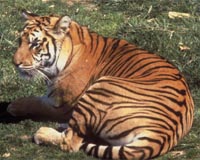| . |  |
. |
Millbrook, NY (SPX) Jan 25, 2011 A distant relative of shrimp, zooplankton are an important food source for fish and other aquatic animals. Long characterized as algae feeders, a new study published this week in the Proceedings of the National Academy of Sciences reports that nearly a third of zooplankton diets are supported by material that originates on land in lake watersheds. The study brings scientists one step closer to clarifying the role that watershed inputs play in aquatic food webs. While it has been recognized that animals living at the bottom of lakes and streams rely, in part, on inputs from the land, there has been controversy about whether open water animals, such as zooplankton, consume this material. Lead author and Cary Institute of Ecosystem Studies limnologist Dr. Jonathan J. Cole comments, "Our work changes the paradigm for how we describe the environment that supports fish. Zooplankton are one of the pillars of the aquatic food web. And while they do feed on algae, they also rely on materials derived from maple leaves, pine needles, and whatever else comes in from the surrounding watershed." Using ambient stable isotopes of carbon, hydrogen, and nitrogen, Cole and colleagues traced the diets of three zooplankton species commonly found in freshwater lakes: Daphnia, Holopedium, and Leptodiaptomus. Animal samples were taken from two Wisconsin lakes with distinct profiles-Paul Lake, a small lake with moderate nutrient levels, and Crampton Lake, a larger nutrient-poor lake. While it has been assumed that the zooplankton feed almost exclusively on algae, biomass analyses revealed a different story. In both lakes, organic matter that originated on land made up approximately a third of zooplankton biomass. When edible algae were scarce, zooplankton derived a higher percentage of their diet from terrestrial material. Cole notes, "Historically, lake ecosystems have been studied in isolation. Yet we know lakes are connected to their watersheds and organic matter from land enters lakes in the form of run-off or ground water." Adding, "Our study adds to the growing body of evidence that aquatic food webs are subsidized by these inputs." This is the most recent of several Cary Institute-led studies investigating watershed inputs to aquatic food webs; all of them have resulted in findings that indicate zooplankton feed on land-generated organic matter. Other authors on the paper included: Drs. Stephen R. Carpenter (Center for Limnology, University of Wisconsin), Jim Kitchell (Center for Limnology, University of Wisconsin), Michael L. Pace (Department of Environmental Science, University of Virginia), Chris Solomon (Department of Natural Resource Sciences, McGill University), and Brian Weidel (Lake Ontario Biological Station, US Geological Survey).
Share This Article With Planet Earth
Related Links Cary Institute of Ecosystem Studies Darwin Today At TerraDaily.com
 Nepal uses satellites to track rare tiger
Nepal uses satellites to track rare tigerKathmandu (AFP) Jan 23, 2011 An injured wild tiger that strayed into a tourist resort in Nepal has been moved to a new home in the jungle and fitted with a satellite collar so its progress can be tracked, the government said. The tiger, an adult male, was captured after it wandered into the resort on the outskirts of the Chitwan national park in southern Nepal, a major tourist attraction, and nursed back to health by pa ... read more |
|
| The content herein, unless otherwise known to be public domain, are Copyright 1995-2010 - SpaceDaily. AFP and UPI Wire Stories are copyright Agence France-Presse and United Press International. ESA Portal Reports are copyright European Space Agency. All NASA sourced material is public domain. Additional copyrights may apply in whole or part to other bona fide parties. Advertising does not imply endorsement,agreement or approval of any opinions, statements or information provided by SpaceDaily on any Web page published or hosted by SpaceDaily. Privacy Statement |